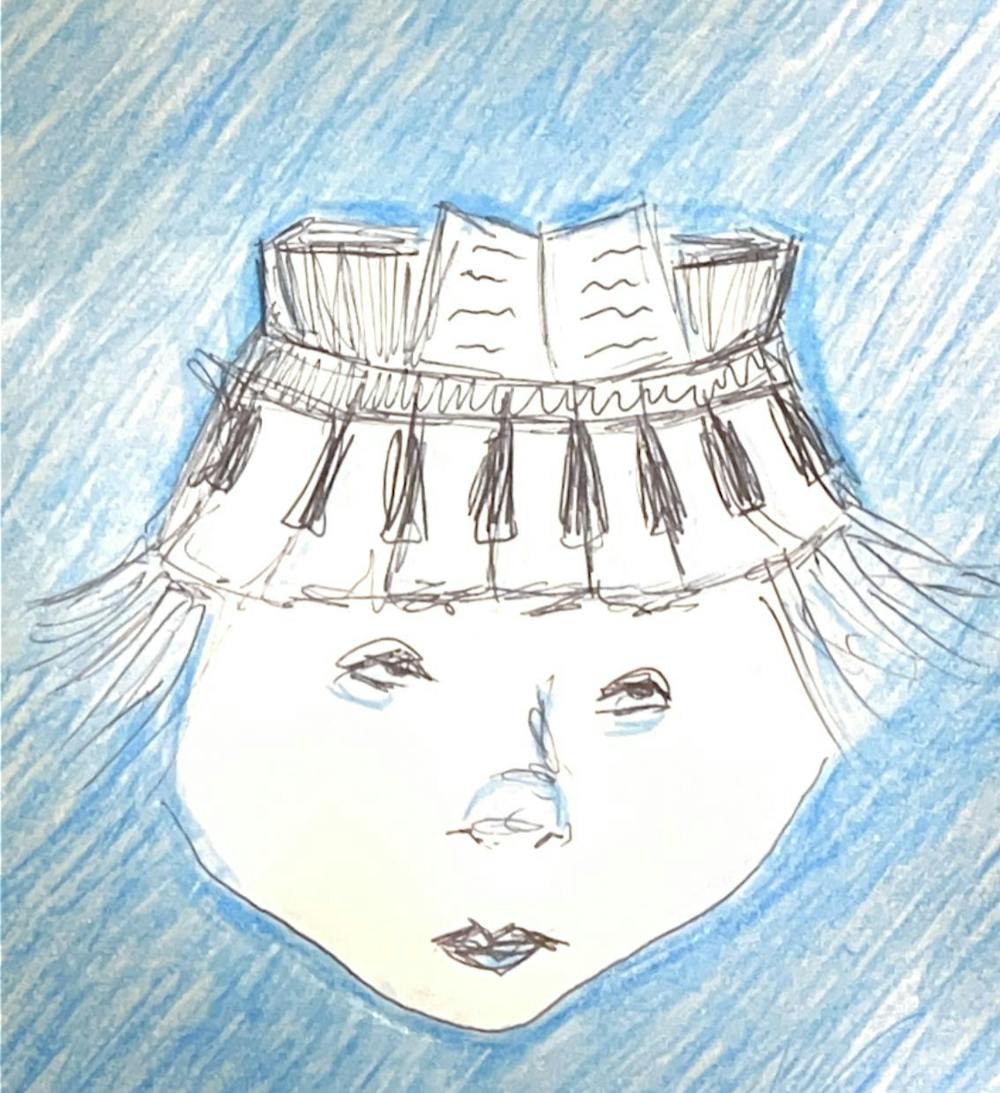O lieb, solang du lieben kannst!
O lieb, solang du lieben magst!
Die Stunde kommt, die Stunde kommt,
Wo du an Gräbern stehst und klagst!
O love, as long as love you can,
O love, as long as love you may,
The time will come, the time will come
When you will stand at the grave and mourn!
From "O lieb, so lang du lieben kannst" by Ferdinand Freiligrath
Across from the jelly donut shop, a block from the train tracks, stood a windowed storefront. At first glance, the small room could be a jewelry shop, with its mahogany cases and images of gem-laden necklaces on the walls. But a closer look revealed that the jewelry mannequins were bare, the shelves empty. You might then notice a child leafing through a Calvin and Hobbes collection at a sturdy wooden desk on the left or a chair piled high with music books further to the right. Then finally, your gaze would touch upon the black upright piano tucked away in the corner, a child intently focused on the sheet music in front of them while a woman in a swivel chair carefully watched on.
Once a week for nine years, my mom pulled up to the “No Parking” zone in front of the tiny piano studio, and I grabbed my bag of books and tumbled out as fast as possible. Simona unlocked the door, sensing my presence at the glass behind her, and I sat down and waited for my turn to play, perhaps Bach one day or a Top 20 radio hit another.
Around the start of my freshman year of high school, Simona presented me with “Liebestraum” by Franz Liszt. She displayed the song like carving a jewel, a shimmering, albeit grueling, task that would reap an incredible result. She said that I could be the last performer at the semi-annual piano recital, an honor that I always saw as being reserved for the oldest, most skilled students.
“Liebestraum” is a song dominated by the left hand. Most piano pieces I have played assign the right hand the central melody, while the left fills in the gaps, but the “voice” of “Liebestraum” comes from the thoughtful pressing of the left hand, while the right fills the background with its quick rising and falling.
Learning the song, I struggled with the sound, how to keep the repetition of my right hand from overpowering the central melody of the left while using the right hand to play notes of the melody when the score dictated. I chipped away at it for months, and slowly a song emerged, but it was not the one I had meant to carve.
***
One year Simona went back to her home country in Europe after her father died. She brought back beads and string for all her students so they could make their own bracelets, as well as tiny vials of rosewater perfume. I picked out two textured black balls of volcanic rock, and one red one. I don’t know where those beads or the perfume are now. I wish I did.
I met a girl during a golf match my freshman year of high school who also took lessons with Simona. We recounted stories: the beads, the way she’d never let us stay alone in the glass-walled studio downtown, how she worked endlessly to make sure that lessons worked for students, rather than for her.
“Simona’s like a mom to us,” she said.
I couldn’t have agreed more.
***
I don’t remember much of what I played that year other than “Liebestraum.” There must have been some of my favorite Ed Sheeran songs, possibly “Memory” from Cats, but as my schedule grew busier with sports and homework and volunteering, lessons dwindled. My progress with “Liebestraum” slowed, and I was unable to get past the 31st measure, a tricky, fast-paced section that my hands couldn’t keep up with. At the end of freshman year, I didn’t make it to the piano recital. It didn’t matter; I didn’t have anything ready to play. I took a break from lessons and “Liebestraum.” I never went back.
Occasionally I passed Simona’s studio when walking downtown, or picking up my friend who still attended. I would wave from the car as Simona opened the door for my friend, hoping that Simona would see me, but she never did. So I caught glimpses from stories, snippets about lessons, whatever new song my friend learned. The lack of piano had quickly felt normal to me, but every anecdote was a mild shock to my system. Things moved on, with or without me.
Two years after I left, I found out that Simona was moving across the country. It seemed logical; it was the height of the pandemic. Everyone was shifting. Soon after, Simona followed me on Instagram, and I saw photos of beaches and sunsets and waving palm trees. She seemed happy, content.
A year later, a month after graduating high school, I received a text that Simona had died, taken by cancer she had kept secret from her students so as not to worry them.
The news left me numb, my head light and thoughts disjointed. She must be living secretly on the beach, enjoying the salty air and lobsters washed up by the surf. She was so young, only around my parents’ age. How could she be gone?
***
Living near Steinert last year, some friends inspired me to dust off my piano skills using the basement practice spaces. One Sunday night, too antsy to work, I grabbed my laptop and took the back staircase down, emerging in a space full of telephone-booth-like rooms. They were small and bare, no dark wooden furniture or stacks of books or pictures of jewelry lining the walls. Finding a cubby, I didn’t think of playing “Liebestraum,” the task too daunting after five years away. Instead, I pulled up Ludovico Einaudi’s “Nuvole Bianche,” the only song I had ever taught myself. The combination of the out-of-tune piano and my out-of-practice fingers left me rushing over the keys, hitting the wrong notes. The song was shaky and frantic, lacking the patient, slow rise it called for. I then tried to play the two songs I had muscle memory for: Ed Sheeran’s “Thinking Out Loud” and Yann Tiersen’s “Comptine d’un autre été: L’Après-midi,” both of which I had performed for church services over five years before. I was able to catch on to the beginnings of both, but by the middle, my fingers lost their memory, and they faltered. The songs had left me. Or perhaps, more precisely, I had left the songs.
***
Thanksgiving of my junior year of high school, Simona texted me.
Happy Thanksgiving
Greetings to everyone
:)
I assumed that the text was generic, something sent to all of her students. After all, she hadn’t seen me in over a year; why would she reach out? I didn’t respond.
***
After Simona’s death, I was desperate to find more of her, to understand her silent choice to spend her last year on the other side of the country. I Googled and Googled, but there was no obituary to be found and little personal information beyond a generic LinkedIn. I did, however, come across her YouTube channel. There, she had posted videos of her playing, as well as some of her singing. Most of the videos were faceless, but I found one with her sitting at a keyboard playing a song she had written. All I could think about was that she seemed alive and whole. How could she have had cancer? How could she have been dying? But I suppose that even over the internet, Simona was good at keeping secrets.
A few months later, I went searching for the channel again, but it was gone. All of the music she had created, the proof I held that she had lived, was no longer at my fingertips.
***
While we colloquially call Franz Liszt’s famous piece “Liebestraum,” its full title is “Liebestraum No. 3 in A-Flat Major.” The song is part of a set of three “Liebesträume” that Liszt composed, all originally meant to accompany German love poems. The third poem, on which Liebestraum No. 3 was designed, was written by Ferdinand Freiligrath. “O lieb, so lang du lieben kannst” or “O love, as long as love you can,” speaks to treating relationships with care, loving as much as you can, as someday that person will be gone. Reading the poem, I reached these stanzas, and felt my stomach twist:
You will say: Look at me from below,
I who mourn here alongside your grave!
Forgive my slights!
Dear God, I meant no harm!
and
Not again: I forgave you long ago!
Indeed, he did forgive you,
But tears he would freely shed,
Over you and on your unthinking word—
Quiet now!—he rests, he has passed.
I am taken back to all the times I did not practice, how I gave up on my instrument, when I did not text back. I know now that I will learn the rest of “Liebestraum No. 3.” The way I should have years ago.
***
Over the nine years I played piano and the five years I have not, my family never threw away any of the sheet music I acquired. The books sit in a basket, gathering dust in the corner of the living room now overrun with my little brother’s Legos.
Despite being able to read music, I never was a good sight-reader. Whenever I began a new piece, Simona would help me by writing out the letters next to each note. She’d circle the sharps and flats, write reminders with smiley faces in the margins telling me to go slow or practice a difficult bridge in a specific way. Some people would look at the music and be overwhelmed by the amount of pencil markings on it, but now I’m grateful.
Simona’s store has become a Thai restaurant. Her voice and songs are gone from the internet. But I still have her handwriting. Hundreds of pages, filled with her.





